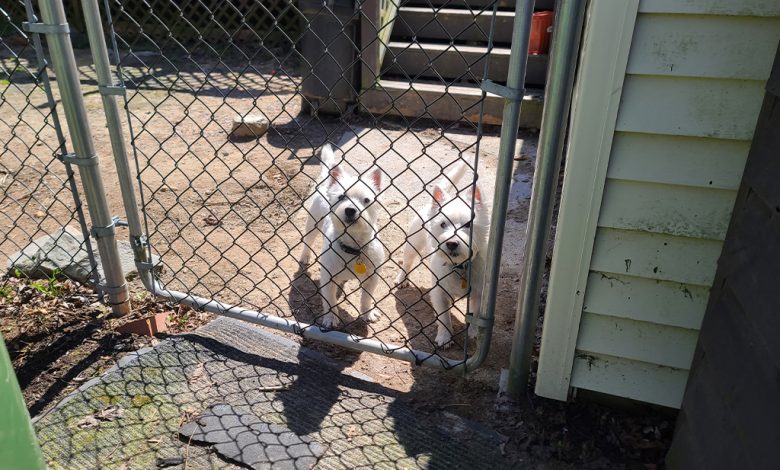Britain’s Missing Half a Mission Ghost Dogs
Four Paws UK exposes online loopholes helping cruel and illegal puppy trade
With the UK reportedly home to 13 million dogs, it is hard to know how many of these beloved companions were illegally imported into the country. Today, FOUR PAWS, the global animal welfare organization has released a brand-new report ‘Tricks of the Trade: the truth about the illegal puppy trade in the UK’ in which it reveals the clear evidence of cruelty many puppies endure before reaching their new ‘forever’ home. It also exposes the many tricks of the trade that unscrupulous breeders use to dupe unsuspecting families.
Since the start of COVID-19, 3.2 million families welcomed a pet into their home. Many of these are likely to have been acquired online, with FOUR PAWS UK evidence showing that in just 12 months (between June 2020 and June 2021) 732% more online adverts for pets were circulated than in the previous period. This equated to over 24,000 adverts, many of which peddled puppies who had been bred in poor conditions and then transported thousands of miles in cramped conditions, onto British shores. Sadly, the cute advert that promised families a quick delivery often hid a sick and suffering puppy.
Supported by a foreword from Marc Abraham – Veterinary Surgeon, Broadcaster, Author, and Animal Welfare Campaigner who has campaigned tirelessly for Lucy’s Law – this report reveals the mass abuse of sick puppies, their parents, and the expectant humans awaiting their arrival in the UK.
Abraham has been an advocate for many years against this greedy trade, which lacking in any compassion or transparency, relies heavily on forged documents and connections with organized crime, dishonest online adverts, and a lack of awareness of responsible breeding and buying practices.
Cute. Quick. Sick.
Almost a third of puppies sold below the age of seven weeks were advertised through Instagram, compared with just 7% of puppies aged nine weeks or older. If being imported a dog should be at least 15 weeks old, meaning puppies are taken from their mothers far too soon. The strains that puppies undergo during these long journeys at such young ages can be highly detrimental to a puppy’s health and development, and it is this early separation from their mother that can cause a plethora of issues further down the line.
Emily Wilson, FOUR PAWS UK Head of Campaigns said:
“We always advocate for adopting a dog whenever possible but appreciate that this isn’t always possible. When considering buying a puppy online, we cannot stress enough just how important it is to think before you click. The shocking findings in our new report highlight the ugly truth behind the trade and how illegal breeders push dogs and their puppies to their physical limits to make as much profit as quickly as possible. With our report finding many of the Eastern European breeders investigated to be offering to falsify puppy documentation, we urge people to be extra vigilant when looking to buy a puppy online.”
The report uncovered that over a third of respondents saw their puppy advertised on social media websites like Instagram and Facebook. In addition, almost a third of all online classified adverts selling dogs were attempting to trade in illegally imported puppies, with Gumtree being the worst offender.
In fact, almost half of all puppies sold on the platform were found to be illegally imported into the UK.
Wilson adds: “Our report also highlights the lack of restriction that both social and sales platforms possess, when allowing the listing of living beings in adverts. An oversight taken advantage of by a trade clearly placing profit over the welfare of the animals involved. We hope that with our new report, these platforms can reevaluate their policies and require more rigorous information from sellers to register and advertise a pet. With this we can ensure the wellbeing of animals advertised and assure a more transparent service which will make it difficult for unscrupulous dealers to operate.”
There are several tell-tale signs people can be vigilant of when recognizing a potential illegal breeder and investigators commissioned by FOUR PAWS found that the most common included:
- The seller suggests meeting in a public place – Although it may feel safer to some buyers to meet in a public setting, this tactic means the seller’s true location can never be known and the puppy’s true background is obscured. As per Lucy’s Law, the sale must take place on the premises in which the puppy is bred and must be seen interacting with its mother before the sale is finalised.
- The puppy advertised in advance of its arrival in the UK – Sellers of imported puppies will advertise puppies before they have arrived in the UK, enabling them to list the puppies and sell them from a much younger age. This would mean that unsuspecting buyers could pick up a much too young puppy straight after a lengthy journey from Eastern Europe, with the animal having received no health care or veterinary checks.
- No photographs or video of puppies with their mother – Sellers may provide photos of the parents rather than of the puppies with the parents – a strong indicator of illicit sales.
- No documentation – Prolific sellers may state that the puppies had a ‘full health check’ before leaving their country of origin, but often do not provide any documentation to prove this. Many puppies are sold without having UK veterinary checks before being advertised, and therefore the health status of the puppies remains unknown at sale.
- Last minute change of location – Imported puppies being sold from a location different from the one stated in the advert indicates suspicious activity. Illegal puppy sellers can change the viewing location, which reduces their transparency and traceability as well as obscuring the background of the puppy.
Wilson concludes:
“The issue of the illegal puppy trade is something that needs tackling at every level. That’s why FOUR PAWS UK will always provide support and advice for individuals looking to buy, for local authorities who enforce licensing legislation, and for these large selling platforms to ensure that together, we can end this cruel trade for good.”






